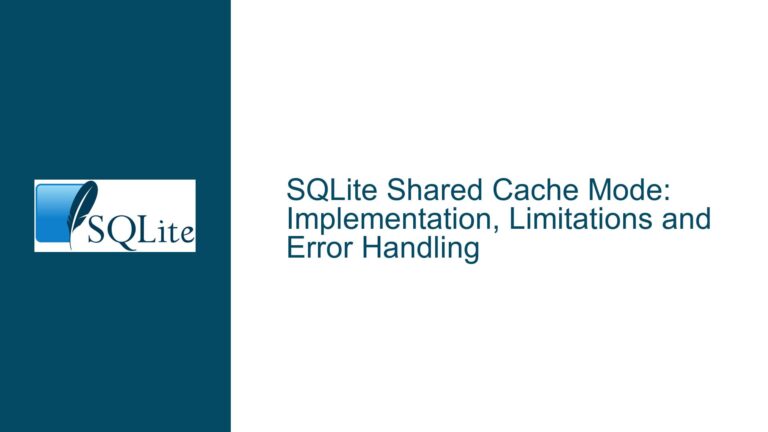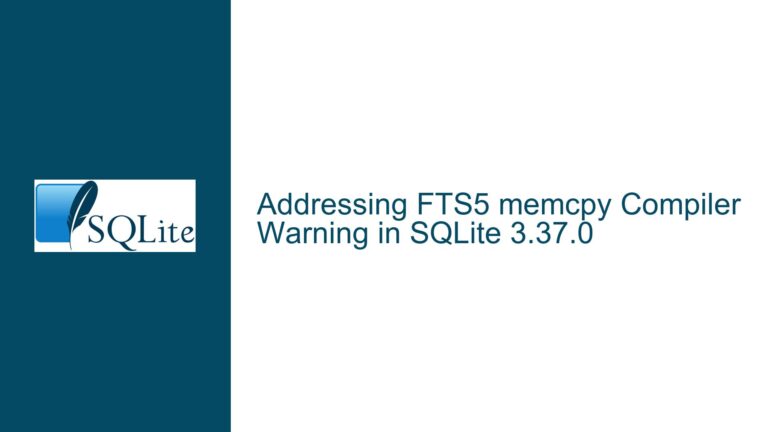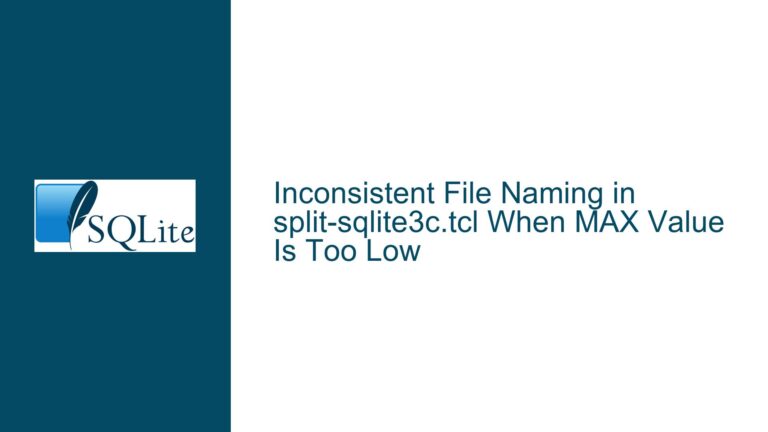Resolving Safari SQLITE_WASM_DEALLOC Function Pointer Mismatch in SQLite WASM Builds
Safari-Specific WASM Function Pointer Mismatch During SQLite Initialization
Issue Overview: Safari Fails to Resolve WASM Function Pointers Correctly
When attempting to initialize the WebAssembly (WASM) build of SQLite in Safari, developers encounter a critical error during the bootstrap phase:
Error: Internal error: cannot find function pointer for SQLITE_WASM_DEALLOC or its variant,
Error: Internal error: sqlite3.wasm.exports[sqlite3_free] is not the same pointer as SQLITE_WASM_DEALLOC.
This issue arises from Safari’s non-standard handling of WebAssembly function pointers, specifically those stored in the indirect function table (a WASM mechanism for dynamically linking functions). SQLite’s WASM build relies on these pointers to manage memory allocation and deallocation routines. The SQLITE_WASM_DEALLOC macro maps to the sqlite3_free C function, which is exposed to JavaScript via the WASM module. During initialization, SQLite performs a sanity check to ensure that the pointer retrieved from the WASM module matches the function entry in the indirect table.
In Safari, this check fails because Safari wraps or anonymizes function entries in the indirect table, breaking pointer identity comparisons. Other browsers (Chrome, Firefox) expose these functions with identifiable names or raw pointers, allowing the equality check to pass. The root cause is a combination of Safari’s opaque handling of WASM function pointers and SQLite’s strict validation logic, which assumes consistent behavior across browsers.
This problem is exacerbated by Safari’s limitations in nested Web Workers (critical for SQLite’s Origin Private File System (OPFS) support) and delayed adoption of fixes for WebKit bugs, such as incorrect SharedArrayBuffer synchronization.
Possible Causes: Browser-Specific WASM Function Table Handling and Validation Assumptions
1. Opaque Function Pointer Handling in Safari’s WASM Implementation
Safari’s WebAssembly engine does not expose function pointers in the indirect function table in the same way as other browsers. When SQLite retrieves the function pointer for sqlite3_free (aliased as SQLITE_WASM_DEALLOC), Safari returns an anonymized function wrapper. This breaks the identity check (===) used by SQLite to validate that the pointer corresponds to the expected function.
For example:
- In Chrome,
wasm.functionEntry(SQLITE_WASM_DEALLOC)returns a named function likeƒ $sqlite3_free(). - In Safari, the same call returns an anonymous function (e.g.,
ƒ 79()), causing the equality check to fail.
2. Overly Strict Sanity Checks in SQLite’s WASM Initialization
SQLite’s bootstrap code includes a validation step to ensure that the deallocator function pointer (SQLITE_WASM_DEALLOC) matches the exported sqlite3_free function. This check assumes that browsers return identical function references for the same WASM pointer, which is true in Chrome and Firefox but not Safari.
3. WebKit Bugs and Delayed Fix Rollouts
Safari’s WebKit engine has historically lagged in implementing WASM and Web Worker features. For instance:
- Nested Web Workers (required for OPFS proxies) were unsupported until a September 2022 WebKit fix, which has not yet been widely deployed in Safari releases.
- A
SharedArrayBuffersynchronization bug (WebKit Bug 250495) disrupts threaded operations, even in Safari Technology Preview builds.
4. Build-Specific Configuration Assumptions
The SQLite WASM build process makes platform-agnostic assumptions about function pointer visibility and indirect table behavior. These assumptions are invalidated by Safari’s non-compliant handling, leading to runtime failures.
Troubleshooting Steps, Solutions, and Fixes
Step 1: Bypass Function Pointer Identity Checks in SQLite WASM
Problem: The bootstrap error occurs because Safari anonymizes function entries, causing wasm.exports[sqlite3_free] !== wasm.functionEntry(SQLITE_WASM_DEALLOC).
Solution: Modify SQLite’s initialization logic to remove strict pointer equality checks. Instead, verify that the function pointer exists in the indirect table.
Locate the Validation Code:
Insqlite3.js, find the block whereSQLITE_WASM_DEALLOCis validated:if (wasm.exports[sqlite3.config.deallocExportName] !== wasm.functionEntry(capi.SQLITE_WASM_DEALLOC)) { toss("Internal error: ..."); }Replace the Equality Check:
Change the condition to verify thatSQLITE_WASM_DEALLOCpoints to a valid function:if (!wasm.functionEntry(capi.SQLITE_WASM_DEALLOC)) { toss("Internal error: ..."); }This skips the browser-specific pointer comparison and only ensures the function exists.
Test in Safari:
Rebuild SQLite and verify that the initialization error no longer occurs. Monitor for memory leaks (see Step 3).
Step 2: Verify Function Pointer Integrity and Memory Management
Problem: Skipping the equality check might hide issues where SQLITE_WASM_DEALLOC points to the wrong function, causing memory leaks.
Solution: Manually validate the function pointer and indirect table entries.
Retrieve the Function Pointer:
In Safari’s dev console (usingtester1.html), execute:const deallocPtr = S.wasm.exports.sqlite3_wasm_ptr_to_sqlite3_free(); console.log('SQLITE_WASM_DEALLOC pointer:', deallocPtr); // Should output an integer (e.g., 3)Check the Indirect Function Table:
Ensure the pointer corresponds to a valid function:const deallocFunc = S.wasm.functionEntry(deallocPtr); console.log('Function entry:', deallocFunc); // Should show a function, even if anonymousValidate Memory Deallocation:
Perform an operation that usesSQLITE_WASM_DEALLOC, such as binding a transient blob:const stmt = db.prepare('INSERT INTO tbl VALUES(?)'); const blob = new Uint8Array([1, 2, 3]); stmt.bind(1, blob, { type: 'BLOB', transient: true }); // Uses SQLITE_WASM_DEALLOC stmt.step();Use Safari’s memory profiler to check for leaks. If the heap does not grow unboundedly, the deallocator is functioning.
Step 3: Address Safari-Specific OPFS and Web Worker Limitations
Problem: Safari cannot spawn nested Web Workers, breaking SQLite’s OPFS proxy.
Workaround: Use a polyfill for nested Workers until Safari updates.
Integrate the
nested-workerPolyfill:
Add johanholmerin/nested-worker to your project:import { NestedWorker } from 'nested-worker';Modify SQLite’s Worker Initialization:
Replace directnew Worker()calls with the polyfill:// Original code const worker = new Worker('sqlite3-opfs.js'); // Polyfilled code const worker = new NestedWorker('sqlite3-opfs.js');Test OPFS Functionality:
Verify that databases persist across sessions and that write operations succeed.
Note: As of January 2023, Safari Technology Preview still has a SharedArrayBuffer bug. Track WebKit Bug 250495 for updates.
Step 4: Monitor WebKit and Safari Releases for Fixes
Subscribe to WebKit Change Logs:
Follow WebKit GitHub for fixes related to:- Nested Web Workers
SharedArrayBuffersynchronization- WASM indirect function table handling
Test with Safari Technology Preview:
Download the Safari Technology Preview to access early fixes.Report Bugs via Apple’s Feedback System:
Use Safari’s built-in bug reporting tool (enabled in the Develop menu) to escalate issues affecting SQLite WASM.
Step 5: Adjust Build Configuration for Safari Compatibility
If the above steps are insufficient, configure SQLite’s build to avoid 64-bit APIs (not recommended long-term):
Disable 64-bit Support:
Rebuild SQLite with-DSQLITE_WASM_NO_64BIT=1to omitBigInt64Arraydependencies.Impact:
This limits integer precision and disables certain features (e.g.,sqlite3_changes64()).
Final Notes
Safari’s non-standard WASM behavior necessitates browser-specific workarounds in SQLite’s JS/WASM layer. While the function pointer check modification resolves immediate errors, ongoing vigilance for memory leaks and WebKit updates is critical. For OPFS support, polyfills and patience for Safari’s rollout cycle are essential until WebKit stabilizes. Developers should prioritize testing across multiple browsers and advocate for standards compliance via Apple’s feedback channels.






